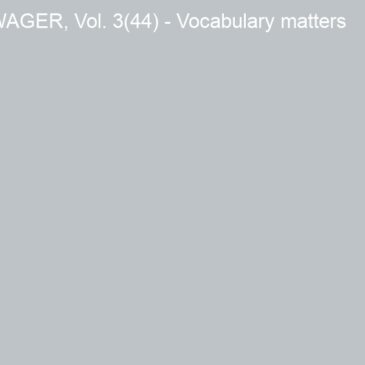Configuring psychiatric schemata and vocabulary is an inherently politically charged process, and the language associated with gambling can be confusing. Conceptual difficulties and labeling problems have caused considerable difficulty for scientists, public policy makers, and patients. DSM-IV provides one response, referring specifically to “mental disorders” as the object of its classification system [1]. For example, “…what are being classified are disorders that people have.” Therefore, each diagnostic category including pathological gambling is, by DSM-IV definition, a mental disorder. Table 1 below illustrates some of the major diagnostic classes of mental disorders with some examples. Currently, DSM-IV classifies pathological gambling as an impulse control disorder. In addition, the American Psychiatric Association uses the concept of disorder to ground their practice guidelines for a range of other addictive behaviors (2). “Disorder” is a clinical term that is employed and applied with utility by clinicians (e.g., the American Psychiatric Association). In addition to the need for overarching constructs (e.g., disorder) during the conduct of a meta-analysis to permit the integration of disparate data, using the concept of disorder is already common in a variety of health care fields. For example, physicians often identify heart valve, clotting, high blood pressure and other cardiac problems as cardiovascular disorders. According to the DSM-IV, the American Psychiatric Association does not formally apply “problem,” “addiction,” or “compulsive” to gambling as diagnostic terms. It is important to remember that psychiatric nomenclature is dynamic; categories such as hysteria and dementia praecox have fallen by the wayside, while newer paradigms such as post-traumatic stress disorder and body dysmorphic disorder have gained acceptance. As new epidemiologic research emerges, it is entirely possible that the psychiatric semantics of gambling will change yet again to accommodate the notion of a spectrum illness. It is also possible that pathological gambling as a primary disorder may soon be distinguished from pathological gambling as a disorder secondary to depression, obsessive compulsive disorder, or mania. In addition, sub-clinical forms of gambling disorders may soon garner more clinical and public policy attention.
Selected DSM-IV Diagnostic Categories:
• Substance related disorders
•Alcohol intoxication
•Cocaine dependence
• Schizophrenia and other psychotic disorders
•Paranoid type
• Mood Disorders
•Major depressive disorder
•Dysthymic disorder
• Anxiety Disorders
•Obsessive-Compulsive disorder
•Acute stress disorder
• Impulse Control Disorders
• Pathological gambling
• Eating Disorders
•Anorexia Nervosa
Sources:
- American Psychiatric Association. (1994). DSM-IV: Diagnostic and statistical manual of mental disorders. (Fourth ed.). Washington, D.C.: American Psychiatric Association, p. xxi.
- American Psychiatric Association. (1995). Practice guideline for treatment of patients with substance use disorders: alcohol, cocaine, opioids. (First ed.). Washington, D.C.: American Psychiatric Association.
This public education project is funded, in part, by The Andrews Foundation and the National Center for Responsible Gaming.
This fax may be copied without permission. Please cite The WAGER as the source.
For more information contact the Massachusetts Council on Compulsive Gambling,
190 High Street, Suite 5, Boston, MA 02110, U.S.




